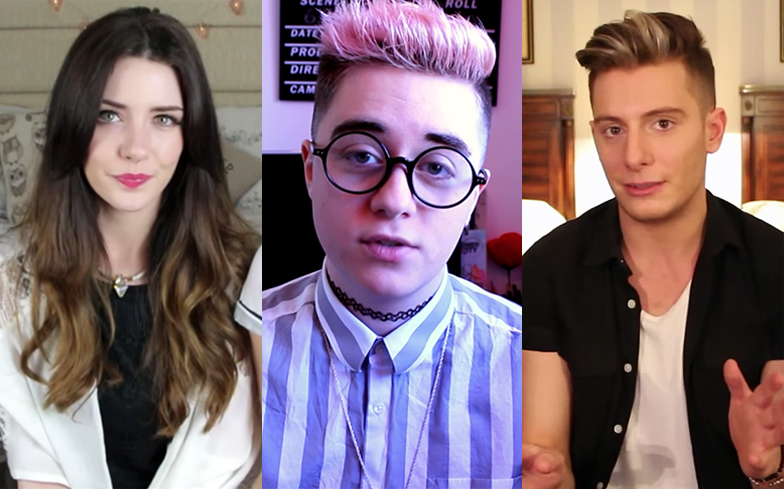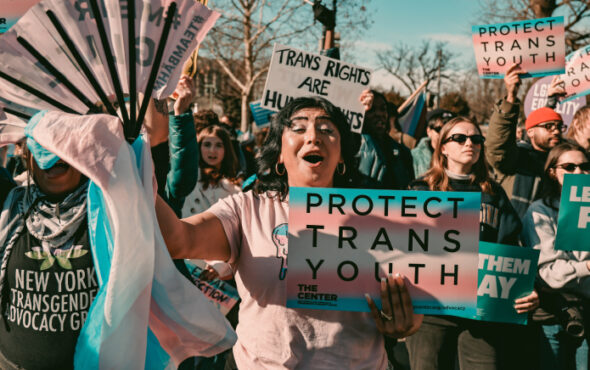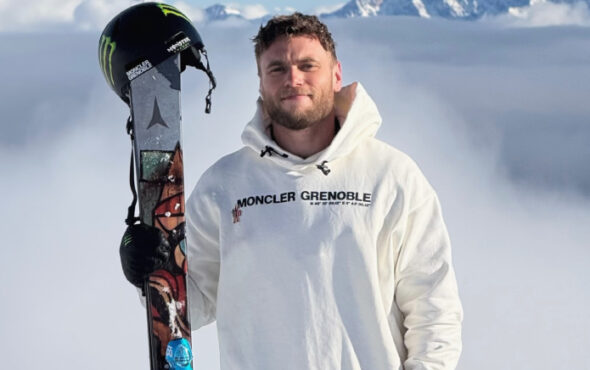
Today (11 October) marks National Coming Out Day.
YouTube has long been utilised by young LGBTQ people to share their journeys of self-acceptance with the world, and as a way for viewers who may be struggling to come to terms with their own sexual identity or gender identity to get advice and support.
So to celebrate National Coming Out Day, we spoke to six content creators from across the LGBTQ initialism about their experiences using YouTube to come out, and to find out how their lives have changed since doing so.
Riyadh K
Why did you decide to use YouTube as the platform to come out publicly on?
Since I first ventured onto YouTube as a shy and closeted gay teen, it has become a safe space for me. I have built up a digital community and a place where I feel I can be unapologetically and authentically myself. Every part of who I am, flaws and all, is celebrated. Although I had some very hateful comments on my videos from homophobic faceless profiles, the love and support I received from other viewers seemed to obliterate my fear and shame once felt because of trolls. I knew by being an open and out young gay man I could hopefully reach other teens in places where being LGBTQ could lead to them being made homeless, being attacked or killed. If I was out then it could be an example that being gay isn’t a life sentence of unhappiness; actually, it can be the opposite. I know that a lot of my followers can’t come out safely given where they live, but I’ve noticed that many of them watch videos by out gay YouTubers and live vicariously through what they see on the screen. They feel that the people they’re watching are like their gay big brother. If my content can help give even one closeted teen even a little bit of relief than that is reward enough for me.
What was the initial reaction like?
The reaction was – and is still – phenomenal. I had a feeling that many of my followers already knew I was gay but the more I spoke about it and the more I shared about coming out to my family, the more love we received. My mother, father and I got thousands of messages, comments and DMs from people all over the world thanking us for sharing our story. My dad still makes a point of reading the new messages that come in. In a roundabout way, the people thanking him for accepting me have made him even more motivated to be an advocate and voice for acceptance.
How has it changed your life since?
The best thing about coming out online to millions of people is that you no longer have to worry about telling everyone “Hey, I’m gay”. It’s something I struggled with in the early days, feeling like I had to come out over and over, even if nobody had asked. I became a sort of accidental activist. What I mean is that media, charities or members of the public began to come to me for advice and quotes on the topic of being young and gay, of homophobia, of fighting for equal rights such as Ireland’s same-sex marriage vote. I wasn’t prepared for it, but in the process I’ve learned to love being a voice on an issue I care so deeply about. It’s an honour to educate and in turn, try to inspire the next generation of queer kids.
Melanie Murphy
Why did you decide to use YouTube as the platform to come out publicly on?
I had never even considered coming out online because back in early 2015, when I did, it wasn’t really a done thing! However, Ireland was to soon become the first country in the world to have a public vote on marriage equality and that was a big deal to me as an activist. At the time most of my activism was kept offline. One night, while out having a pint with my gay friend Stephen Byrne – an Irish television personality – I made a passing comment about a hot girl and we got talking about sexuality. He asked me if I’d ever use my platform to encourage people to talk about LGBTQ issues or to simply mention the referendum, and that was the lightbulb moment. I realised that nobody was holding me back from breaking out of the content bubble I was stuck in. I could talk about what really mattered to me. That’s when I decided to ask my gay pals, Riyadh and James, to help me with a coming out video. I was really nervous! Up until that point my channel was basically food and makeup. I’ve never looked back!
What was the initial reaction like?
It was overwhelmingly positive! The comments were full of “I’M BI, TOO”, and I received thousands of DMs, emails, and tweets from people coming out for the first time to me. I probably spent most of that week happy crying. So many people found the video helpful – it was essentially a guide to coming out for the first time! And a lot of new people came to my channel so my corner of the internet became super queer it was fantastic.
How has it changed your life since?
Through coming out online I’ve met some of my best friends, attended Pride in London twice with incredible ally brands – in the past I never had the money to travel over for it – and I’ve discovered a huge sense of purpose through my educational content around bisexual issues. I’ve done talks in schools, I premiered a spoken word film about being a femme bi at a film festival, I’ve had teachers and parents reach out to thank me for being so vocal and I finally found the confidence to approach girls! A lot of my bisexuality content was made during the two years I spent single, and I feel like that was a massive personal growth period for me. I got to share that. Which was wonderful. Even now that I’ve got a partner again, I’m still making bisexuality videos, because we’re the mostly-invisible majority of the LGBTQ community and we don’t have enough voices screaming loudly enough about our validity and our experiences. My life has become mega colourful and I love it!
Jake Edwards
Why did you decide to use YouTube as the platform to come out publicly on?
I’ve always used YouTube as a diary; it’s the perfect platform to air your feelings and share your stories with others who don’t see this narrative elsewhere. Mainstream media doesn’t often cover stories of trans and non-binary people in an authentic way, but people need to hear what we have to say. It’s a great way to educate through compassion and help those who may be in the same position.
What was the initial reaction like?
After coming out as non-binary I was expecting to lose a lot of subscribers and open myself up to being targeted by transphobia. It’s not the same as when I came out as transgender (FtM), because there’s more understanding for the binary. But, to my surprise, almost everyone was supportive and understanding – I think I’m lucky enough to be surrounded by very open and loving people, and I rarely attract blind hatred, I’ve always been aware and grateful that I seem to exist in this bubble on YouTube. Although, I think one of my videos about being non-binary was shared on a transphobic blog which sent a small hoard of ignorant people to my comments section, but that was very easy to deal with thanks to my thick skin and the block button.
How has it changed your life since?
I definitely feel more open to explore and express myself. I have found a sense of duty to my community and other non-binary people, which can be a burden, but I’m thankful that people listen to me and I get the opportunity to educate others. Nothing is more important to me than making a difference in this world. If I can help pave the way for other trans and non-binary people, I’ll do everything I can. My life has changed for the better because I can live my authentic life online and help others realise that it doesn’t always end in losing friends and being attacked.
Roly
Why did you decide to use YouTube as the platform to come out publicly on?
I have been an avid viewer of Youtube from the very beginning. I remember being this scared 16 year old and just stumbling across some of the old LGBTQ YouTubers at the time in 2006/2007 and they gave me so much hope that I could be happy. After a couple of years, I started coming out to people in real life and I really wanted to help other young people who were struggling, so In 2008 I created a channel and it all started from there. YouTube was the reason I got through it and I just knew this was the platform I wanted to use to help others as it helped me.
What was the initial reaction like?
It was amazing! It’s actually funny thinking back to it now because YouTube was such a different place then. The community and the closeness you got from people is not something that you get as much now. I made so many friends and got so many amazing messages from people so fast. I was only getting a few hundred views on a video but because vlogging was still such a new thing, there were hardly any creators doing LGBTQ content so you became friend with everyone and no one cared about numbers or who’s better than who like it is now.
How has it changed your life since?
Everything I have in my life now is because I started making YouTube videos. 10 years ago I was a scared teenager living in Devon with no idea what I wanted to do with my life. I had no LGBTQ friends around me and 99% of the people in my life just told me that making videos was a waste of time. I was constantly told I should focus on getting a “real job” because this will go nowhere. Cut to now, I have moved to London, I live with my best friend who I met through YouTube, have a huge queer family that have my back no matter what, I get to help thousands of people across the world to be themselves and this is my job? It’s incredible! With enough work, you really can make your dreams come true. I know that’s corny as hell, but it’s true. I feel so lucky and so thankful to everyone who’s supported me and helped me along the way.
Calum McSwiggan
Why did you decide to use YouTube as the platform to come out publicly on?
Although I was never in the closet, when I first started YouTube I very much fought against becoming a “gay YouTuber,” I wanted instead to be a “YouTuber who just so happened to be gay” and didn’t want my content to focus on my sexuality at all. It didn’t take long, though, until I started to receive dozens of messages from young LGBTQ people asking questions and asking for advice, and I quickly began to realise the importance of representation. So many people turn to YouTube to look for more people like them, and YouTube offers a safe space for them to explore their gender or sexual identity before they’re ready to do it in real life. I really wanted my channel to serve as a safe space for these people, that’s why my channel is now dedicated to LGBTQ issues and queer culture, and why I try to make my content as educational and informative as I can.
What was the initial reaction like?
The more LGBTQ content I created, the more people flocked to my channel. I thought that talking about my sexuality might deter people from watching, but instead it brought in droves of new people who felt just like me. Today the majority of my audience are LGBTQ and they come to my channel looking for content that is specifically aimed at them. I do get a fair amount of hate comments too, every video I upload is spattered with a few dozen homophobic comments, but those comments are always drowned out by the overwhelming love and support I get from my audience.
How has it changed your life since?
I have found a wonderful sense of community with YouTube, the LGBTQ community here in the UK are a particularly close knit and welcoming group of people, and I very much consider them my second family. My best friend (Doug Armstrong) came out as gay on YouTube three years ago and my housemate (Roly) came out as trans two years ago, and they have both received an enormous amount of support from the community. To anyone considering coming out online – or any LGBTQ people considering creating their own channel – I very much encourage you to do so, we’ll be waiting to support you when you do.
Jamie Raines
Why did you decide to use YouTube as the platform to come out publicly on?
I’ve been open about being transgender on my YouTube channel from the beginning, as I started it primarily to document and share my transition. I wanted to share this on YouTube specifically, because as a platform it had been the most helpful resource for me figuring things out and not feeling alone in the way I felt. I also feel like YouTube allows for the most openness and connection with other people, as it’s more than just a photo or text. I wanted to be able to help in the same way, so decided to be open online with my transition.
What was the initial reaction like?
Initially I only received something silly like ten views a video! Those that did comment though were supportive, and I slowly grew a lot of support with people finding the content useful. There were always negative comments as well, and those used to get to me a lot in the beginning. You’d have one person fully supportive and thanking you for the information, and then another person calling you slurs and saying you’re just a butch lesbian. Having said that, even to this day, there are so many more positive comments than negative ones, and it’s worth it to be helping others.
How has it changed your life since?
Being out as trans online has changed my life a lot, and also shaped it. I was 17 when I started sharing my transition publicly, and I feel like I’ve grown a lot since then. I feel like having this online presence has given me a sense of purpose, an opportunity to give back. A lot of the opportunities I have in my life have come about because I chose to share my transition online and I don’t regret it at all.



